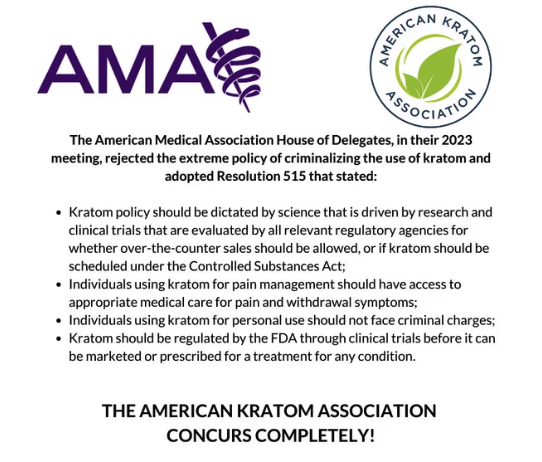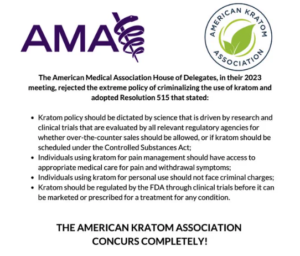The organization’s House of Delegates, which met last month to consider numerous resolutions, also declined to approve an additional measure to revise its stance on marijuana in a way that would have maintained its opposition to legalization while implicitly recognizing the benefits of regulating cannabis products—instead opting to continuing its advocacy for prohibition without the newly proposed regulatory language.
This comes about a year after AMA delegates voted to amend its policy position to support the expungement of past marijuana convictions in states that have legalized the plant.
At the most recent meeting, the body tackled several different areas of drug policy.
The American Kratom Association (AKA) cheered the adoption of a new resolution that says people “who are using kratom only for personal use should not face criminal consequences”—though the measure also says that the substance should be “evaluated by the relevant regulatory entities for its appropriateness for sale and potential oversight via the Controlled Substances Act, before it can be marketed, purchased, or prescribed.”
It further says that kratom “should be regulated by the [Food and Drug Administration], and its safety and efficacy should be determined through clinical trials before it can be marketed or prescribed as a treatment for any condition.”
While advocates want consumers to be able to continue to purchase kratom from retailers, AKA sees the resolution’s adoption as a step in the right direction, departing from a more aggressive criminalization stance.
With respect to psychedelics, AMA’s delegates voted in favor of a separate measure to advocate “for continued research and therapeutic discovery into psychedelic and entactogenic agents with the same scientific integrity and regulatory standards applied to other promising therapies in medicine.”
The resolution, however, also advocates “against the use of any psychedelic or entactogenic compound (such as psilocybin or MDMA) to treat any psychiatric disorder except those which have received FDA approval or those prescribed in the context of approved investigational studies.”
AMA Immediate Past President Jack Resneck Jr. said in a press release that the organization “believes that scientifically valid and well-controlled clinical trials are necessary to assess the safety and effectiveness of all new drugs, including the potential use of psychedelics for the treatment of psychiatric disorders.”
“The AMA appreciates that lawmakers want to help address the mental health crisis in the U.S., but there are other straightforward approaches that don’t thwart drug-safety assessment and regulation, such as increasing coverage and removing barriers to care for evidence-based treatments,” he said.
The delegates also adopted an additional resolution that voices support for continuing to include “cannabis metabolite analysis in relevant drug testing analysis performed for occupational and municipal purposes.”
The stance, which comes as numerous institutions remove marijuana testing requirements amid the state-level legalization movement, specifies that AMA supports continued cannabinoid screenings in “pre-employment, post-accident, random and for-cause” testing.
Members also had the chance to add to a series of other existing marijuana positions with a new resolution that opposes legalization “until” research proves its medical efficacy and calls for warning labels and advertising restrictions. But the delegates instead decided to reaffirm the group’s existing platform that still maintains an opposition to legalization, describes cannabis as a “dangerous drug” and supports social equity in states that have enacted the reform.
The proposed change would have added language that tacitly recognizes the potential opportunities of legalization and regulating marijuana:
“That our AMA Council on Legislation draft state model legislation for states that have legalized ‘medical’ or ‘recreational’ marijuana that (1) prohibit dispensaries from selling marijuana products if they make any misleading health information and/or therapeutic claims, (2) to require dispensaries to include a hazardous warning on all marijuana product labels similar to tobacco and alcohol warnings and (3) ban the advertising of marijuana dispensaries and marijuana products in places that children frequent.”
While opposing legalization, the resolution seems to recognize that unlike in the illicit market, states that allow and regulate cannabis sales present the opportunity to enact labeling and advertising rules—though the measure was ultimately not approved.
Delegates did adopt a separate measure that expresses support for eliminating the sentencing disparity between crack and powder cocaine and providing retroactive sentencing for those who’ve been impacted.
“The disparity has no basis in science,” AMA Trustee Ilse Levin said. “There are no significant pharmacological differences between the drugs. Not only do we need to stop the disparity, but we also need to go back and ensure justice for those who were convicted under these unjust laws.”








